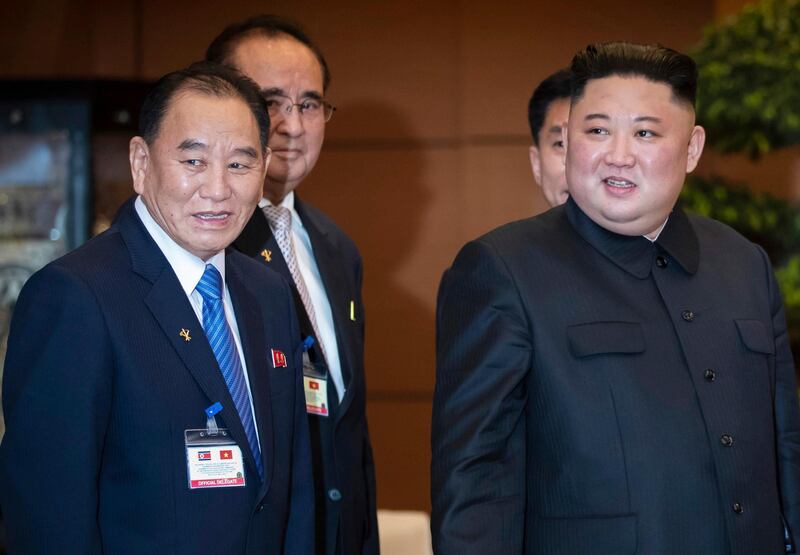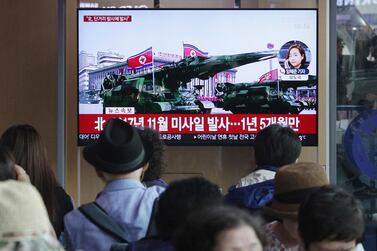North Korea's former top nuclear envoy, who was allegedly purged over the failed nuclear summit with United States, accompanied leader Kim Jong-un to a musical performance, state news agency KCNA said on Monday. Reports from the neighbouring South Korea have claimed execution of top officials involved in the nuclear talks.
Kim Yong-chol was the top negotiator for his country as well as the counterpart of US Secretary of State Mike Pompeo since North Korea entered into nuclear talks with the US early last year. Mr Yong-chol traveled to Washington and met President Donald Trump twice before the two summits between the nations.
Negotiations between Washington and Pyongyang have been at a standstill since February when the second summit between Mr Trump and Mr Kim broke down over what the US described as excessive North Korean demands for sanctions relief in exchange for a partial surrender of its nuclear capabilities.
South Korean newspaper Chosun Ilbo last week cited an unidentified source to report that Mr Yong-chol had been sentenced to hard labour and ideological re-education over the failed summit in Hanoi.
The newspaper also reported that senior envoy Kim Hyok-chol, who was involved in pre-summit talks with American officials, was executed with four other officials from the North's Foreign Ministry at Mirim Airport in Pyongyang.
"He (Mr Hyok-chol) was accused of spying for the United States for poorly reporting on the negotiations without properly grasping US intentions," Chosun Ilbo's source was quoted as saying.
South Korea's government and media have a mixed record on tracking developments among North Korea's ruling elite, made difficult by Pyongyang's stringent control of information.
Lee Sang-min, spokesman of Seoul's Unification Ministry which deals with inter-Korean affairs, said the ministry would not comment on a "specific internal event in North Korea or its participants" when asked about Mr Yong-chol's reappearance in public.
Seoul's spy service has said it could not confirm Friday's report of a possible purge, while the presidential Blue House cautioned against "hasty judgments or comments". Mr Pompeo told reporters in Berlin that he had seen the report and the US was "doing our best to check it out."
The report came at a delicate time for diplomacy as North Korea has recently tested short-range missiles and issued belligerent rhetoric towards American and South Korean officials. Mr Kim declared in April that the Trump administration has until the end of the year to come up with mutually acceptable terms for a deal to salvage the negotiations.
North Korea has previously executed scapegoats to atone for high-profile political failures. But while many experts believe Mr Yong-chol was pushed to a back seat in negotiations with the United States, many had doubts about the report of a purge.
Cheong Seong-chang, an analyst at South Korea's Sejong Institute, said Mr Yong-chol, who is also rumored to have health problems, would not have appeared in public this quickly if he was undergoing political re-education. Mr Cheong said it would not make sense for Mr Kim to execute Mr Hyok-chol when Mr Yong-chol, the more senior official, would be seen as more responsible for the failure in Hanoi.
"If Kim Jong-un sentences senior officials to hard labour, executes them, or puts them in political prison camps over the collapse of meetings, then no official would be willing to step up in external negotiations," Mr Cheong said. "It's unlikely that Kim would issue extreme punishment unless he's giving up on the talks with the United States."
Mr Yong-chol's rise during the nuclear negotiations had baffled many North Korea watchers because he handled South Korea ties, not international or US relations. Previously, he was a military intelligence chief believed to be behind a slew of provocations, including two deadly attacks in 2010 that killed 50 South Koreans and an alleged 2014 cyber attack on Sony Pictures. Both Seoul and Washington imposed sanctions on him in recent years.
Many experts in South Korea believe experienced foreign ministry hands such as Foreign Minister Ri Yong-ho and First Vice Foreign Minister Choe Son-hui are likely to take the lead in North Korea's nuclear diplomacy as it prepares for the possibility of protracted and complicated negotiations with Washington.






